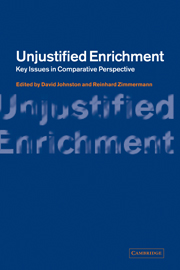Book contents
- Frontmatter
- Contents
- List of contributors
- Preface
- Table of cases
- List of abbreviations
- I Introduction
- II Enrichment ‘without legal ground’ or unjust factor approach
- III Failure of consideration
- IV Duress and fraud
- V Change of position
- VI Illegality
- VII Encroachment and restitution for wrongs
- VIII Improvements
- IX Discharge of another person's debt
- X Third-party enrichment
- 18 ‘At the expense of the claimant’: direct and indirect enrichment in English law
- 19 Searches for silver bullets: enrichment in three-party situations
- XI Proprietary issues
- XII Taxonomy
- Index
18 - ‘At the expense of the claimant’: direct and indirect enrichment in English law
Published online by Cambridge University Press: 31 July 2009
- Frontmatter
- Contents
- List of contributors
- Preface
- Table of cases
- List of abbreviations
- I Introduction
- II Enrichment ‘without legal ground’ or unjust factor approach
- III Failure of consideration
- IV Duress and fraud
- V Change of position
- VI Illegality
- VII Encroachment and restitution for wrongs
- VIII Improvements
- IX Discharge of another person's debt
- X Third-party enrichment
- 18 ‘At the expense of the claimant’: direct and indirect enrichment in English law
- 19 Searches for silver bullets: enrichment in three-party situations
- XI Proprietary issues
- XII Taxonomy
- Index
Summary
Introduction
Some time ago a study by Jack Dawson compared the German and American positions on the requirement of ‘directness’ in the law of unjust enrichment. It is not at all easy to come up with a satisfactory short statement of that requirement, but, broadly speaking, its effect is to restrict liability to the first or immediate enrichee and to forbid leapfrogging the proper defendant in order to sue remoter recipients who, on one argument or another, might also be said to have been enriched at the claimant's expense. Dawson's study concluded that German law had chosen to insist rather strictly on directness, while American law, although agreeing with German law in a number of important and recurrent situations, had never committed itself to the same dogma. Proceeding in a characteristically pragmatic manner, it had allowed a variety of claims which could not have satisfied any requirement that the enrichment must have come directly from the claimant.
This subject has preoccupied German jurists but has been very little visited by English lawyers. Niall Whitty's recent study of the Scots law, heavily influenced by German and other civilian writing, has served to draw English attention to the deficiency. More recently still, Sonja Meier, who has made a speciality of comparison between the German and English law of unjust enrichment, has written an important and helpful article in the Cambridge Law Journal, which once again reminds us of the need to take this subject much more seriously.
- Type
- Chapter
- Information
- Unjustified EnrichmentKey Issues in Comparative Perspective, pp. 493 - 525Publisher: Cambridge University PressPrint publication year: 2002
- 4
- Cited by

